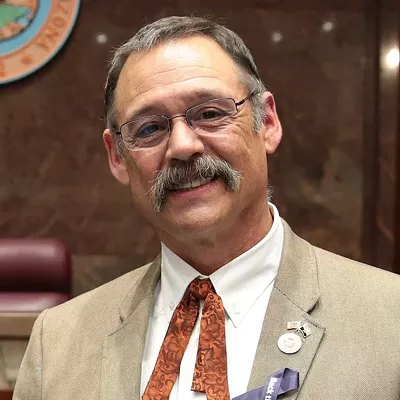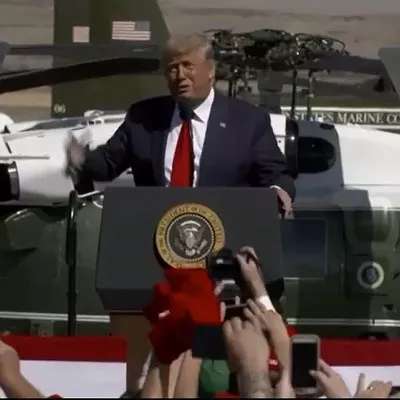The last time an elected Tucson City Council member was tossed out by voters was in 1989, when Democrat Steve Leal took out Republican Roy Laos.
But political ambition springs eternal; all three incumbents seeking re-election are facing challenges from upstarts making their first foray into city politics.
Despite the long odds, the challengers are willing to spend their evenings at neighborhood meetings. They're willing to risk looking like idiots at debates. They're willing to walk door to door to hand out literature. They're willing to fill out surveys, often about topics they know next to nothing about. They're willing to ask strangers for money.
And they do it all for a job that involves listening to complaints about potholes, reading tedious reports about planning procedures and sitting through long, long public meetings every Monday.
The pay: $24,000 a year (although you're eligible for a car, as long as you don't order one of those fancy electric hybrids).
As Republican Armando Rios put it at a recent candidate forum: "People have asked what I was smoking, what I was drinking, when I got into this."
Ward 1
OVER THE COURSE of his second term, Democrat José Ibarra has often been willing to poke and prod his colleagues on the council, particularly the four-member alliance of Mayor Bob Walkup, Republican council members Fred Ronstadt and Kathleen Dunbar, and Democrat Carol West.Just last month, Ibarra called for an investigation into whether Walkup aide Andrew Greenhill violated the law when he issued a press release announcing Walkup would attend an event welcoming home the troops at GOP headquarters. Police found no evidence of wrongdoing.
Ibarra's rubbed the majority the wrong way so often that after the 2001 council election, the council voted to bypass him in the regular rotation of the largely ceremonial position of vice-mayor, giving the slot to West instead.
At 33, Ibarra's the youngest member of the council, but he's a political veteran. He entered local politics as a protégé of then-Supervisor Raúl Grijalva, ran George Miller's first mayoral campaign in 1991 and worked Southern Arizona for Bill Clinton in 1992. He won his first term in 1995 at the young age of 25, slipping through a five-candidate Democratic primary. He easily won re-election four years ago against a weak Republican candidate.
This year, Ibarra has drawn a challenge from Republican Armando Rios. Rios, 34, grew up in a low-income neighborhood in westside Tucson. His ticket out was athletics; a stand-out defensive back on Tucson High's team, Rios landed a spot on the football team at Fort Lewis College in Durango, Colo. After his football career ended prematurely, he returned to Tucson and now works for former UA basketball star Sean Elliott, who hired Rios to represent him with local business affairs.
Rios is certainly a political rookie. In fact, he's never even voted in a city election. He says he only got involved in politics this year because so many people encouraged him to challenge Ibarra. "We need new vision and new leadership," he says.
But Rios has yet to develop that vision. On many issues--transportation, downtown redevelopment, billboard restrictions--he offers few solutions beyond promising to bring people together to build consensus.
But that hasn't prevented Rios from persuading people to open their checkbooks. He says he's already raised at least $40,000, which--provided he qualifies for city matching funds--will double to $80,000. Since that's roughly the maximum the program allows council candidates to spend this year, he's already done all his necessary fund raising.
Rios hopes to follow the same path to victory as Republicans like Fred Ronstadt and Kathleen Dunbar--an aggressive get-out-the-vote effort among supporters on the eastside while appearing moderate enough for central-city Democrats. His strategists include Judi White and Ann Charles, who helped Dunbar win the Ward 3 seat two years ago.
But the GOP strategy has only worked so far with open seats, not against incumbent Democrats with active political machines.
Ibarra says he's not sweating it. He's feeling so invulnerable that he says he's not even going to bother to raise much money for the race.
"You know what?" he says. "I'm just going to say, 'Jim Click, you want to come take me on? Take me on.'"
The deadline to register to vote in the Nov. 4 general election is Oct. 5.
Ward 2
WITH THE MAYOR AND Council split between four Democrats and three Republicans, Democratic Councilwoman Carol West has often found herself the swing vote on issues ranging from approving this budget to keeping City Manager Jim Keene employed.A onetime director of the Tucson Water Resources Council, West, 62, came up in city politics as an aide to former Ward 2 Councilwoman Janet Marcus. When Marcus stepped down to run for mayor four years ago, West avoided a primary challenge and beat Republican Rick Grinnell citywide, although she got fewer votes than the GOP candidate within her own ward.
Democrats, frustrated by West's willingness to play for the other team, have recruited local calligrapher Lianda Ludwig to give her a race in the Sept. 9 primary. The roughly 14,700 Democrats and 8,300 Independents in the eastside ward will decide the future of the seat, partially because West's Republican colleagues on the council discouraged the GOP from opposing her.
Ludwig, 51, says she wants to reach out to "creative people with new ideas."
"I see myself as one of those people with new ideas," the former school guidance counselor says. "What I'd like to do is make a people-friendly and child-friendly city where there are good jobs and a trickle-up attitude."
A Brooklyn transplant who has lived in Tucson for seven years, Ludwig has never sought public office. Her inexperience sometimes shows--at a neighborhood forum last week, she depended heavily on note cards when staking out her platform--but she's has grabbed support from some veterans. Former Mayor George Miller, who's serving as her campaign chairman, says he's dismayed by cuts in kids' programs and other fraying in the social safety net.
"Without making Carol out to be an evil person and all that kind of crud, she just has accepted the role of Mayor Walkup and the other two Republicans," Miller says. "And above all else, she's been taken in totally by the city manager, Jim Keene. Their position is, 'We've got a problem here and we can't possible solve it without taking away all these things that are nice, but not really necessary for running the government.'"
Ludwig likewise criticizes those cuts. To further differentiate herself from West, she's gathering signatures for a citizen initiative to build a light-rail system and improve bus service. She urges people to patronize local merchants and advocates for solar energy. And she's courting the neighborhood associations whose support has helped Democrats win primaries, if not general elections (which wouldn't be a problem in this case, given that winner-take-all primary).
Ludwig is working specific pockets of discontent in Ward 2, reaching out to voters angry at West for supporting a Target store at Harrison Road and Old Spanish Trail, as well as a plan to add turf to the eastside Case Natural Resources Park.
West defended her record on neighborhood issues at last week's forum, citing her own past involvement in her neighborhood and her attendance at association meetings.
"Neighborhoods are the foundation and I'll fight for them on all levels to try to see that quality of life is improving," West says.
The deadline to register to vote in the Sept. 9 primary is Aug. 11.
Ward 4
SHIRLEY SCOTT RODE a wave of neighborhood politics into office back in 1995. Although she's swung back and forth across the political spectrum during her first two terms, she's definitely returning to her roots as she pursues re-election.Scott, a Democrat who owns a screw and fastener distributorship with her husband, Joe, is calling her platform the JFK plan: Jobs, Family and Kids. While the council majority voted to raise fees for the Kidco program, Scott argued that the city should eliminate fees altogether and offer free daycare.
Scott, 60, is facing Republican Mike Jenkins, a self-described working man whose day job is fixing cars.
Jenkins, 54, grew up in Tucson. Following his graduation from Catalina High, he signed up with the Marines and did a tour of Vietnam before returning to earn an agricultural degree at the UA. Since then, Jenkins has worked as a dairy manager, a volunteer firefighter and a truck driver.
"I'm a blue-collar worker," Jenkins says. "I know what the average working person faces every day. I know what the traffic looks like and where every chuckhole is on the roads I travel."
At this point in the campaign, Jenkins is keeping much of his ideas to himself, for fear that Scott will use his platform against him. But he advocates a back-to-basics philosophy. "What we have to do is take care of the city's transportation and public safety," he says.
While it's his first foray into city politics, Jenkins has lost two races for the Arizona House of Representatives in the last three years. Despite having more experience than the other two rookies, Jenkins still has rough edges to sand down; at a forum last week, he wound up his opening remarks with a dramatic, "Just remember ..."
Then, after a pause, he concluded, "I forgot."











